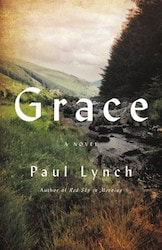
Grace is my third of the six novels short-listed for this year’s Walter Scott Prize for Historical Fiction. (The other two I’ve read are Jennifer Egan’s Manhattan Beach and Rachel Malik’s Miss Boston and Miss Hargreaves.)
Grace seems to have a very divided reception. Many readers praise its lyrical Irish prose and the evocation of the dismal suffering wrought by the Irish Potato Famine in the middle of the 19th Century.
For me, however, it was a slog, as epic in nature as the one undertaken by Grace herself in the novel. In 1845, when Grace is fourteen, her mother Sarah, pregnant with her fifth child and already suffering penury, fears that Grace’s mostly absent father, Boggs, has started showing an unnatural interest in Grace. So Sarah wakes her in the middle of the night, cuts her hair extremely short, dresses her as a boy, and kicks her out of the house, telling her to go find work somehow and to return after the failed crop is behind them with some money saved.
Grace’s younger brother, Colly, sneaks out to go with her as she leaves Donegal and starts wandering south. The rest of the novel is the five-year odyssey Grace undergoes before returning. I won’t spoil any of the plot details beyond that much, in case you choose to read this one yourself.
My problem with the novel is that it’s a journey without much of a purpose other than survival (important, to be sure, but hard to sustain for 350 pages of aimless wandering through poverty and hopelessness).
Grace comes of age on this trip, and in the last chapter, she considers what her five-year journey has taught her: “you think you make your own choices in life but we are nothing but blind wanderers, moving from moment to moment, our blindness forever new to us.” It’s scant consolation for the misery that is her journey and her life. This one just doesn’t hold any appeal for me, in the end.
Grace seems to have a very divided reception. Many readers praise its lyrical Irish prose and the evocation of the dismal suffering wrought by the Irish Potato Famine in the middle of the 19th Century.
For me, however, it was a slog, as epic in nature as the one undertaken by Grace herself in the novel. In 1845, when Grace is fourteen, her mother Sarah, pregnant with her fifth child and already suffering penury, fears that Grace’s mostly absent father, Boggs, has started showing an unnatural interest in Grace. So Sarah wakes her in the middle of the night, cuts her hair extremely short, dresses her as a boy, and kicks her out of the house, telling her to go find work somehow and to return after the failed crop is behind them with some money saved.
Grace’s younger brother, Colly, sneaks out to go with her as she leaves Donegal and starts wandering south. The rest of the novel is the five-year odyssey Grace undergoes before returning. I won’t spoil any of the plot details beyond that much, in case you choose to read this one yourself.
My problem with the novel is that it’s a journey without much of a purpose other than survival (important, to be sure, but hard to sustain for 350 pages of aimless wandering through poverty and hopelessness).
Grace comes of age on this trip, and in the last chapter, she considers what her five-year journey has taught her: “you think you make your own choices in life but we are nothing but blind wanderers, moving from moment to moment, our blindness forever new to us.” It’s scant consolation for the misery that is her journey and her life. This one just doesn’t hold any appeal for me, in the end.
 RSS Feed
RSS Feed
